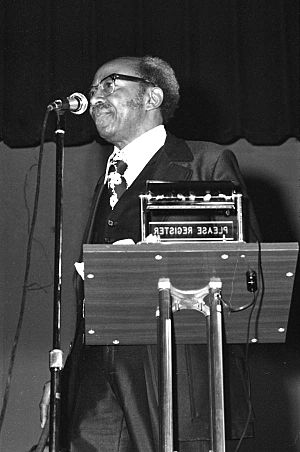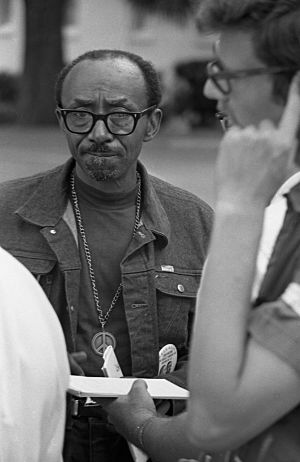Charles Kenzie Steele facts for kids
Charles Kenzie Steele was an important preacher and a leader for civil rights. He was born on February 17, 1914, in McDowell County, West Virginia. He passed away on August 19, 1980, in Tallahassee, Florida.
Steele helped organize the Tallahassee bus boycott in 1956. He was also a key member of the Southern Christian Leadership Conference (SCLC). This group worked for equal rights for all people.
In 2018, a part of Orange Avenue in Tallahassee was named the C.K. Steele Memorial Highway to honor him.
Contents
Early Life and Calling
Charles Kenzie Steele was the only child of a coal miner. From a young age, he knew he wanted to be a preacher. He started preaching when he was just 15 years old.
Steele graduated from Morehouse College in 1938. After college, he preached in different cities like Toccoa and Augusta, Georgia. He then served at the Hall Street Baptist Church in Montgomery, Alabama, from 1938 to 1952.
In 1952, Steele moved to Tallahassee. There, he became the pastor at the Bethel Missionary Baptist Church. He met Martin Luther King Jr. around this time.
Leading the Tallahassee Bus Boycott
The Tallahassee bus boycott began in May 1956. This happened during the time of the Civil Rights Movement in America. Like other boycotts, it started because Black people were forced to sit in the back of the bus. They also had to give up their seats to white people.
The boycott began when two students refused to give up their seats. They were arrested. To protest this unfair treatment, an organization called the Inter-Civic Council was formed. Steele was chosen as its president.
Steele and other protesters organized carpools. This helped people get around without using the buses. Because of the boycott, the city bus system stopped running for the first time in 17 years on July 1. Steele was arrested many times during this period for his activism.
Many people in Tallahassee did not agree with the protesters' demands. Steele and the other activists faced strong opposition. The Ku Klux Klan tried to scare them by burning a cross in front of Steele's church. They also marched in front of his house and threw bottles at his windows.
The city leaders were against letting Black and white people ride buses together. However, the bus system finally became integrated two years later.
Fighting for Equal Rights
Steele was also the main person in a lawsuit to end segregation in schools. This led to public schools in Leon County becoming integrated.
He took part in many other protests and marches. He helped to make public places equal for everyone. In 1957, Steele helped Dr. Martin Luther King Jr. create the Southern Christian Leadership Conference (SCLC). He became the First Vice President of the SCLC under Dr. King.
Steele also participated in the Selma to Montgomery marches in 1965. These marches were very important for civil rights.
Steele passed away in 1980 at the age of 66 in Tallahassee.
Steele's Lasting Legacy
In 1983, a new bus station was built in Tallahassee. It was named after Steele to honor his work. A statue of him, made by sculptor David Lowe, was placed at the bus station.
In 1980, Florida State University gave Steele an honorary Doctor of Humane Letters degree. This was a very special award. He was the first African American to receive this honor from the school.
The Bethel Missionary Baptist Church in Tallahassee, where Steele was a pastor for 28 years, started a charter school. It is named the Steele-Collins Charter School, honoring both Steele and former Governor Leroy Collins.
In 2012, Steele was added to the Florida Civil Rights Hall of Fame. This recognized his important contributions to civil rights.
On March 23, 2018, Florida Governor Rick Scott signed a law. This law named parts of Orange Avenue in Tallahassee as the C.K. Steele Memorial Highway. This was another way to remember his dedication to justice and equality.
 | Frances Mary Albrier |
 | Whitney Young |
 | Muhammad Ali |



